 |
 |
 |
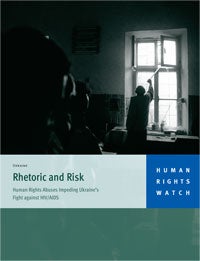 |
“Rhetoric and Risk: Human Rights Abuses Impeding Ukraine's Fight Against HIV/AIDS" Ukraine: March 2006 Ukraine is home to the worst HIV/AIDS epidemic in Europe, and one of the fastest-growing epidemics in the world. The epidemic has been fuelled by harsh drug policies and routine police abuse against drug users those hardest hit by HIV/AIDS together with widespread discrimination by health care providers against drug users and people living with HIV/AIDS. Ukraine law and policy incorporates human rights protections such as guarantees of the right to HIV/AIDS information, to confidentiality of HIV/AIDS test results, to free medical care for people living with HIV/AIDS and progressive, evidence-based policies such as syringe exchange and opiate substitution therapy. But these important government commitments have been systematically undermined by chronic human rights abuses by police and health care workers. Physical and psychological abuse by police of injection drug users and sex workers, and discriminatory and dehumanizing treatment by health care workers of drug users and people living with HIV/AIDS have kept many from receiving lifesaving HIV/AIDS information and services. Unless immediate and concerted action is taken, these human rights abuses could undo many of the important steps that Ukraine has taken to stop its HIV/AIDS epidemic. I have been arrested before at this spot [the needle exchange point]. . . . There were syringes on the ground. A policeman came and picked up the syringe and said, Its yours, and charged me. . . . I am afraid to carry syringes because of police. Sometimes I avoid the needle exchange because of police. |
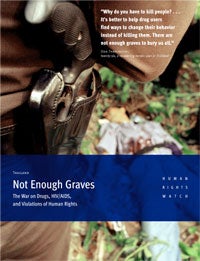 |
“Not Enough Graves: The War on Drugs, HIV/AIDS, and Violations of Human Rights in Thailand” July 2004 A violent anti-drug crackdown has severely tarnished Thailand’s human rights record and undermined its fight against HIV/AIDS. In a three-month period that began on February 1, 2003, Thailand’s “war on drugs” led to the shooting deaths of more than 2,000 people in apparent extrajudicial executions, as the government placed thousands of suspected drug offenders on blacklists and referred to them as the “scum of society.” The government blamed most of these killings on violence among drug traffickers, and in August 2003, Thai Prime Minister Thaksin Shinawatra instituted a shoot-to-kill policy against anyone suspected of smuggling drugs from neighboring Burma. Atrocious in their own right, these killings – and the state-sponsored campaign of fear that accompanied them – have driven scores of injection drug users into hiding, placing them at high risk of HIV infection from the sharing of blood-contaminated syringes. With HIV rates soaring above 40 percent among heroin users, the Thai government must halt its illegal and inexcusable counternarcotics practices if it wishes to curb its raging HIV/AIDS epidemic. “They will be put behind bars or even vanish without a trace. Who cares? They are destroying our country.” |
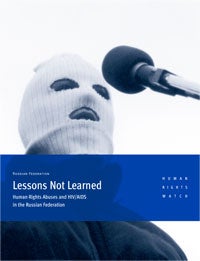 |
"Lessons Not Learned: Human Rights Abuses and HIV/AIDS in the Russian Federation" April 2004 The Russian Federation faces a deadly AIDS epidemic that is being driven by human rights abuses of the more than 1 million Russians living with HIV/AIDS and whose marginalized status puts them at high risk of the disease. Though injection drug use is the primary cause of HIV transmission in Russia, the Russian government has done little to support measures that would prevent the spread of HIV by these means. The government has permitted police to disrupt syringe exchange programs and it bans outright the use of methadone to treat opiate addiction – measures that have been proven central to effective HIV prevention. Harsh penalties for small-scale drug possession has landed many drug users in jail, and the absence of HIV prevention services in prisons (and elsewhere) has spelled a death sentence for many of these people. Yet rather than learning from the experiences of countries with more mature HIV/AIDS programs, Russia has systematically rejected well-established lessons of fighting AIDS. It has also done little to combat common stigma and ignorance related to HIV infection, including the misperception that HIV can be spread through casual contact. To prevent the further spread of this growing epidemic, the Russian government must act to combat ignorance and abuse “The doctor told me that they would rather give treatment [for HIV/AIDS] to me than to my sister who still uses drugs. They told my sister ‘you’re not worth it—sooner or later you’ll just wind up in prison.’” |
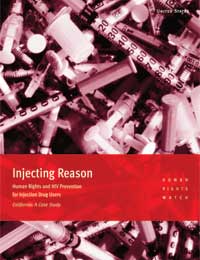 |
September 2003 A quarter-century into the AIDS epidemic, injection drug use remains a major risk factor for HIV transmission in the United States, accounting for up to half of all new infections. While the proper and consistent use of sterile syringes would all but eliminate this problem, efforts to provide sterile syringes are scattered, lack support, and remain heavily regulated by an intricate body of state law. Though the U.S. Public Health Service and the Centers for Disease Control and Prevention have both promoted the importance of using sterile syringes, laws in many states have made their unauthorized possession a criminal offence. In California, the clash of these two policies has been clear: while syringe exchange services are legal in several counties, until 2004 the unauthorized possession of hypodermic syringes was illegal statewide. As a result, drug users have been arrested, harassed, searched and penalized for possessing these sterile syringes that in some instances were legal to obtain but illegal to possess. In counties that have banned syringe exchange outright, drug users have resorted to finding syringes in trash cans, dumpsters and “shooting galleries,” where HIV infection poses a high risk. The health value of sterile syringe programs is beyond dispute. But to prevent the further spread of HIV among these drug users, state and federal law must come together to support such programs. “I am more afraid of carrying a needle than sharing one.” |
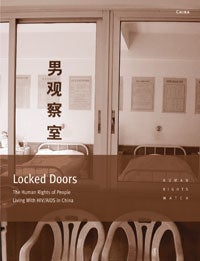 |
“Locked Doors: The Human Rights of People Living with HIV/AIDS in China" China: September 2003 Widespread discrimination by state and public sectors against those living with HIV/AIDS in China has forced many victims to live like fugitives. Fired from their jobs, evicted by their landlords and oftentimes refused care by hospitals because of their HIV status, these people fear dying a painful death alone, in squalor, with no one to bring food or change their sheets, afraid to show their faces to neighbors. At one Chinese hospital in Yunnan, Human Rights Watch found that the door to an AIDS ward had been closed and padlocked. Yet rather than effectively addressing these abuses, the Chinese government has contributed to the problem. They have placed restrictions on journalists, activists and grassroots AIDS organizations who are trying to educate about the issue. They have allowed the arbitrary detention of injection drug users – who are at high risk of contracting HIV through needles – and required mandatory HIV testing at state facilities and violated confidentiality codes. They have also failed to take essential action to treat those infected with HIV by state-run blood collection centers in seven provinces in the 1990s, and have not prosecuted those responsible. If China wishes to curb this epidemic before it reaches monstrous proportions, it must accept responsibility for these egregious abuses and take action to stop them. “When I get sick, later, I might just leave here. I don’t want to take medicine. I’ll just go somewhere far away, a nice place, and wait to die.” |
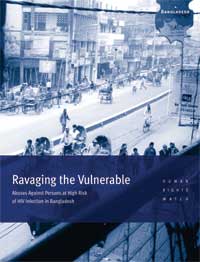 |
“Ravaging the Vulnerable: Abuses Against Persons at High Risk of HIV in Bangladesh” August 2003 Evidence has shown that early in HIV/AIDS epidemics, when the disease is limited to specific populations engaging in high-risk behaviors, the most effective anti-AIDS strategy is to protect and respect the rights of these people. In Bangladesh, where HIV/AIDS rates are relatively low, the government has taken the opposite approach. Vulnerable groups, such as sex workers, drug users, and men who have sex with men, already marginalized from society, have faced frequent and violent abuse – abduction, rape, arrest and extortion – at the hands of police, as well as mastans, powerful thugs who sometimes act as musclemen for Bangladesh’s political parties. Such abuses have been shown to make these high-risk groups more difficult to reach with HIV prevention services, and less able to protect their own health. These abuses not only violate both Bangladeshi law and international human rights law, but reduce Bangladesh’s capacity to curtail an emerging epidemic. “One night, three police officers came to my hotel room and asked for sex. I was sleepy and refused. They started to beat me, especially on the face, and locked me in the room overnight.” |
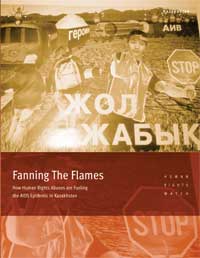 |
“Fanning the Flames: How Human Rights Abuses Are Fueling the AIDS Epidemic in Kazakhstan” June 2003 The government of Kazakhstan has had a rare and limited opportunity to contain the rapidly-growing spread of HIV/AIDS, which in 2003 had infected more than 25,000 people. So far, the spread of HIV/AIDS in this former-Soviet republic has been largely confined to specific populations – in particular, injection drug users (who make up more than 80 percent of those living with HIV/AIDS) and sex workers. But human rights abuses have impeded drug users’ and sex workers’ access to treatment and prevention programs, fueling an epidemic that could be contained. Injection drug users have been regularly subjected to police brutality, denied due process, have faced false criminal charges, and cannot obtain humane or effective substance abuse treatment. Sex workers face rape, violence and extortion by police. Overall, those living with HIV/AIDS have faced social isolation and discrimination in jobs, housing and government services. If the spread of this epidemic is to be curbed, these abuses must be addressed. “Sometimes I injected three or four times with the same needle... or used dirty needles... when I didn't have enough money on me for new needles, and because of the police it was too frightening to go to the drugstore.” |
 |
“Abusing the User: Police Misconduct, Harm Reduction and HIV/AIDS in Vancouver” May 2003 Vancouver, British Columbia, is home to one of the worst AIDS epidemics in the developed world, with injection drug users making up the majority of new cases. In April 2003, the Vancouver Police Department launched a major drug crackdown in Vancouver’s impoverished Downtown Eastside neighborhood, where 40 percent of drug users were estimated to be living with HIV/AIDS. The stated purpose of this crackdown was to clear the streets of drug dealers, but one of its consequences was been to drive drug users underground and away from lifesaving HIV prevention services. Human Rights Watch found that, out of fear of police harassment or arrest, drug users had curtailed their use of needle exchange programs, a vital service for HIV and hepatitis C prevention. Street-based health services, crucial to assisting injection drug users and the homeless, have been greatly impeded, causing some health workers to fear a major new wave of disease transmission. City officials and police must address this problem before it exacts a high and avoidable human cost. “I'm not even being arrested, they're not even reading me my rights. They just like grab me.... He said, ‘Well, you're too clean to be an addict’... which means I must be a dealer.... What did I do wrong, other than living in the poorest zip code in Canada?” |
